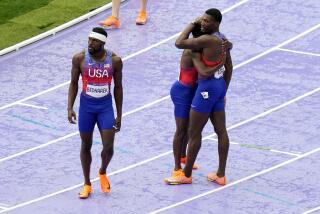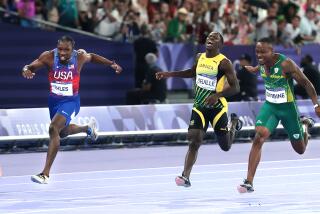Showdown or Slowdown: Johnson Meets Lewis : Track: One seems a shadow of himself, the other rounding into form in their first race against each other since Seoul.
- Share via
LILLE, France — The world may have waited 2 1/2 years for this 100-meter race, but Carl Lewis and Ben Johnson couldn’t be any more indifferent on the eve of their first meeting since the 1988 Olympics.
And with good reason.
Lewis can still run. Johnson can’t.
“My form is off, my technique is off and my power is not even 60%,” Johnson said, adding, “I should be further along, but I’m not.”
As a result, Lewis and a cast of such fresh young runners as Mark Witherspoon and Mike Marsh could give Johnson the world beating of his comeback at the BNP Grand Prix meet tonight in northeastern France.
Lewis seemed almost unaware that Johnson was in the field.
“Ben’s just out there,” he said. “There are no special feelings. My form, what I have to do (with) my teammates--that’s what matters to me. (Johnson) is just out there on the track.
“Ben and I have not raced in the same race in a long time and probably never clean, and people are anxious to see that. It’ll be a good race.”
Asked if Johnson can still be a force in international track, Lewis turned on his interviewer.
“I learned in school never to answer a question with a question, but do you?” he asked. “Does anybody?”
Certainly not Soviet pole vaulter Sergei Bubka, who handicapped the race earlier in the day.
“There’s a big difference between Johnson and Lewis,” he said. “Very big difference, maybe five or seven meters. Johnson is not the same Johnson he was three years ago. Very big difference. I don’t believe it.”
At Seoul, Johnson obliterated the 100-meter world record--running 9.79 seconds to Lewis’ 9.92--then failed a drug test. But since his two-year ban ended in January, he has been a shadow of his former self--slower and smaller yet altogether unsympathetic.
On paper it hardly seems a fair fight. Johnson has yet to win an outdoor race since beginning his comeback--his indoor season wasn’t so hot either--and his best time (10.40) doesn’t even rank among the top 15 of the year. It will cost him dearly, too.
Because of a clause reportedly inserted into his contract with the Lille promoters, Johnson’s failure to run 10.17 seconds by July 1 will reduce his payday by 25%. Johnson and Lewis were to have split $500,000, but Johnson may wind up with a fraction of that amount.
“One of my goals is that I should be able to run 10.17,” he said. “But if I’m not that fast they get some (money) back.”
For a time, the Lewis-Johnson race nearly was bumped off the marquee. A scheduled showdown between Leroy Burrell and Michael Johnson in the 200 meters had become the hot ticket until Johnson switched over to the 400 Sunday afternoon.
Burrell remains one of the biggest names in track, and he smashed Lewis’ 100-meter world record with a time of 9.90 at the U.S. championships earlier in June. But Burrell’s decision to stick with the 200--meet organizers briefly announced he would run the 100--salvaged what little remained of the Lewis-Johnson dual.
“I had plenty of opportunities to be in the (100-meter) race,” Burrell said. “But I had a plan I made a long time ago, and I stuck with it. I didn’t want to be in the 100.”
Lewis is close to regaining his old powers even as he turns 30 today. After skipping most of the indoor season because of arthroscopic knee surgery, he won the long jump at the U.S. championships in dramatic fashion and ran a 9.93-second 100 meters.
“I stopped surprising myself a long time ago,” he said.
More to Read
Go beyond the scoreboard
Get the latest on L.A.'s teams in the daily Sports Report newsletter.
You may occasionally receive promotional content from the Los Angeles Times.






